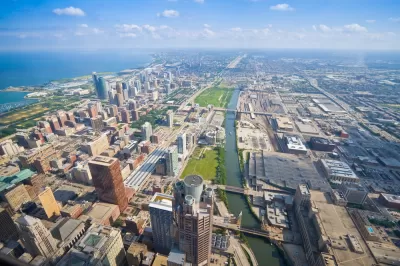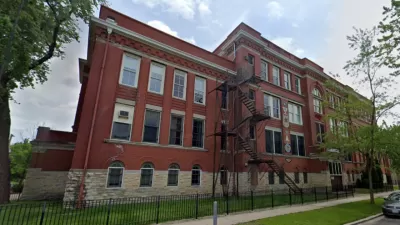A dataset on health measures in U.S. cities shows the difference in life expectancy between two Chicago neighborhoods is 30 years.

Jamiles Lartey reports on an analysis of health outcomes in U.S. cities that shows the biggest discrepancy in life expectancy between two neighborhoods in a city is in Chicago. "In predominantly white Streeterville, Chicagoans can expect to live to 90. In Englewood, where the population is virtually all black, life expectancy is just 60."
The City Health Dashboard is a project from NYU Langone Health that has compiled data on a series of health measures for the 500 largest American cities. The 30-year gap in life expectancy in Chicago highlights the extreme differences that can exist within the same city as a result of factors such as poverty, access to health care, and violence.
In Englewood, public health researchers are trying to understand what is driving the problematic health outcomes, writes Lartey:
[Rodney] Johnson is one member of a team of "community health navigators" who this week began conducting a door-to-door survey. One of the most pressing questions they’re trying to answer is why there seems to be a disconnect between services that are actually available in the community and residents who do not use them.
Lartey notes that while the situation in Englewood is dire, residents are also taking initiative to improve health and the quality of life in their neighborhood. Empty lots have become gardens and community spaces, residents advocated to bring a Whole Foods into Englewood, and nonprofit organizations are working with youth to address gun violence.
FULL STORY: 'It's totally unfair': Chicago, where the rich live 30 years longer than the poor

Alabama: Trump Terminates Settlements for Black Communities Harmed By Raw Sewage
Trump deemed the landmark civil rights agreement “illegal DEI and environmental justice policy.”

Study: Maui’s Plan to Convert Vacation Rentals to Long-Term Housing Could Cause Nearly $1 Billion Economic Loss
The plan would reduce visitor accommodation by 25% resulting in 1,900 jobs lost.

Planetizen Federal Action Tracker
A weekly monitor of how Trump’s orders and actions are impacting planners and planning in America.

Waymo Gets Permission to Map SF’s Market Street
If allowed to operate on the traffic-restricted street, Waymo’s autonomous taxis would have a leg up over ride-hailing competitors — and counter the city’s efforts to grow bike and pedestrian on the thoroughfare.

Parklet Symposium Highlights the Success of Shared Spaces
Parklets got a boost during the Covid-19 pandemic, when the concept was translated to outdoor dining programs that offered restaurants a lifeline during the shutdown.

Federal Homelessness Agency Places Entire Staff on Leave
The U.S. Interagency Council on Homelessness is the only federal agency dedicated to preventing and ending homelessness.
Urban Design for Planners 1: Software Tools
This six-course series explores essential urban design concepts using open source software and equips planners with the tools they need to participate fully in the urban design process.
Planning for Universal Design
Learn the tools for implementing Universal Design in planning regulations.
Caltrans
Smith Gee Studio
Institute for Housing and Urban Development Studies (IHS)
City of Grandview
Harvard GSD Executive Education
Toledo-Lucas County Plan Commissions
Salt Lake City
NYU Wagner Graduate School of Public Service



























